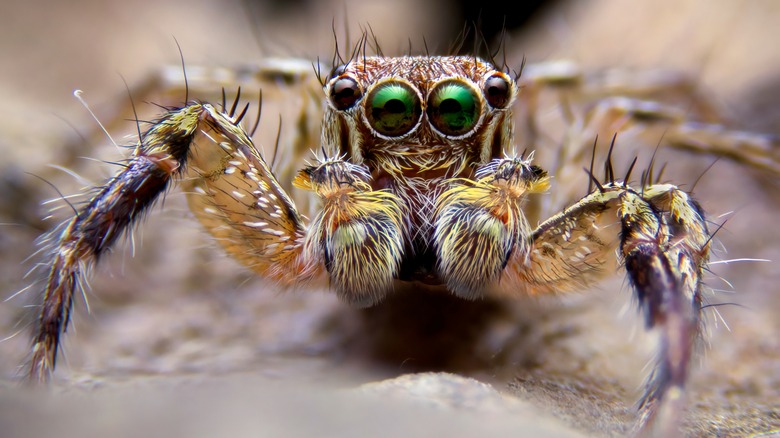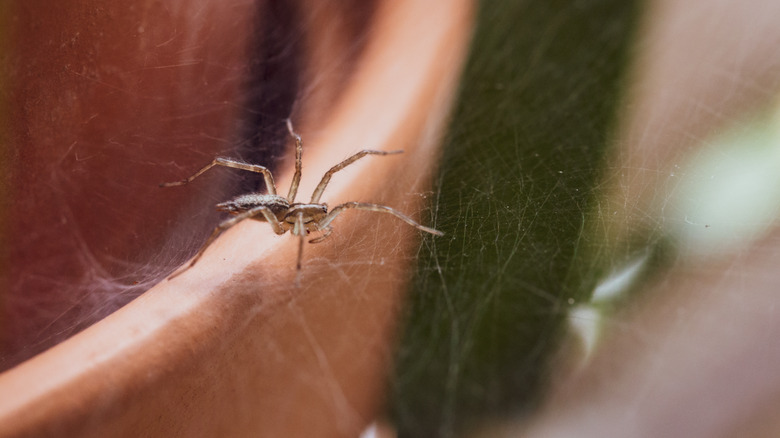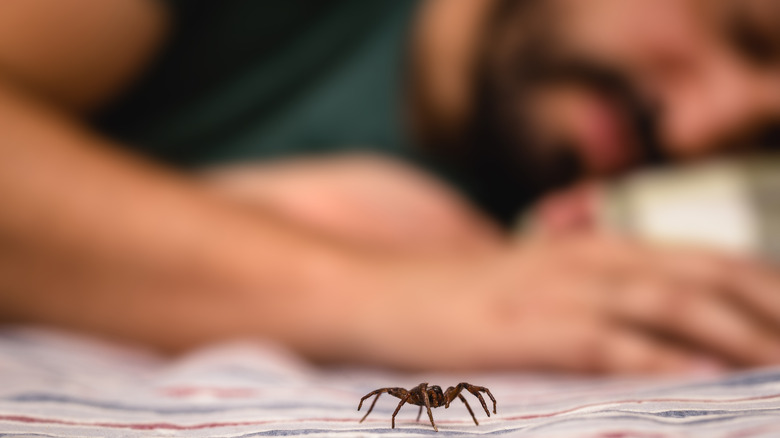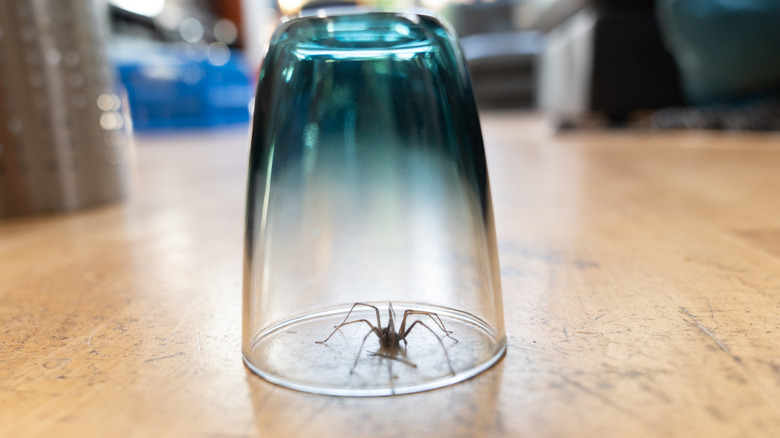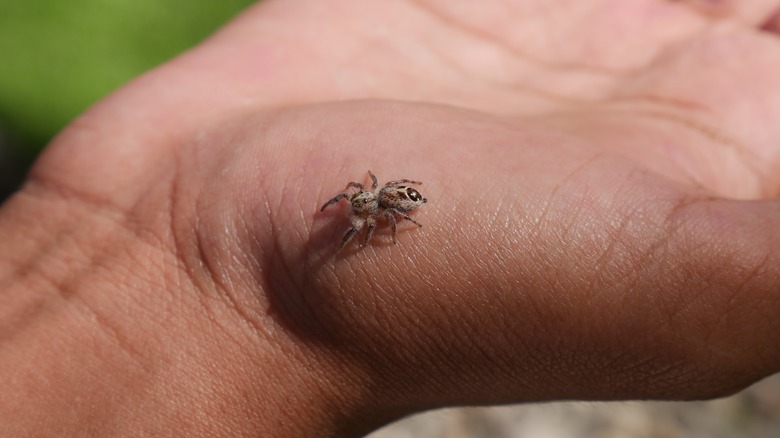Here's Why You Shouldn't Kill Spiders In Your Home
While you probably don't want to think about it, there are most likely hundreds of bugs living in your home right now. A 2016 study published by PeerJ, which observed the kinds of arthropods found in 554 rooms throughout 50 North Carolina homes, discovered that almost all of the rooms were teeming with many different species. Arthropods are animals (including crustaceans, spiders, and insects) with segmented bodies, jointed limbs, and an exoskeleton. In the study, various types of spiders were among the most commonly found in the homes, along with flies, beetles, and ants.
As to those spiders, when you notice that an eight-legged creature has joined you in the room, what's your first reaction? Do you run in search of a shoe to kill the arachnid? Do you fearlessly grab a tissue and squish it between your fingers? Or, do you leave it alone? Those who leave the critter to live peacefully in their home may be doing themselves more good than they've imagined. Saving spiders will not only save you from having to clean off splattered messes from your floors or walls, it will also come with some notable benefits.
Spiders feast on pests
The main benefit of befriending these eight-legged acquaintances is that spiders eat the insects you don't want in your house, like mosquitos, ants, beetles, flies, and moths. To kill their prey, spiders inject them with an enzyme from their fangs. This turns the bugs' insides into a liquid, which they then suck out and eat. While this process may sound disgusting, it's also the reason why your home may be free from most bothersome pests. If you discover empty arthropod exoskeletons in your home, for example, know that a spider has recently been snacking. There are two ways that spiders catch insects; they either hunt them down or trap them in their web. This use of webs is quite common for most household arachnids, therefore, you may want to refrain from using a duster on them.
Bugs like mosquitoes and flies can be quite annoying, especially if they continuously fly around your head or emit a buzzing noise. On a more serious note, some can also carry diseases such as Lyme and malaria. A 2018 study published by the International Journal of Mosquito Research found that spiders can be especially useful in killing mosquitos that carry malaria. This would, of course, have tremendous benefits for us humans.
Most spiders aren't dangerous
Unlike the large poisonous spiders you may have seen in movies, almost all of the species that live in the U.S. are harmless to humans. In fact, if you believe that you've been bitten by a spider in the past, you may want to think again. According to arachnologist Chris Buddle, what many believe to be spider bites are actually either reactions from chemicals or bites from insects like fleas. The expert explains that spider bites aren't common. "I've been handling spiders for almost 20 years, and I've never been bitten," he said in an interview with Live Science. "You really have to work to get bitten by a spider, because they don't want to bite you."
Arachnid bites only happen when the critter is afraid or startled, for example, if you quickly place your hand inside a crevice they're hiding in then you might get bit. Leave them alone and they should leave you alone, too. Additionally, there are only two species that could be dangerous here in the U.S., which include the widow and recluse groups. Seek medical attention if you believe you have been bitten by a widow or recluse spider; all other types shouldn't be a cause for concern.
Safely removing spiders is simple
Those with a fear of spiders, also called arachnophobia, may still want these eight-legged creatures out of their home. If this is the case for you, your first line of defense could be to use ingredients you may already have on hand. According to a 2018 study published by the Journal of Economic Entomology, mint oil and chestnuts can be powerful repellents. Placing one or both of these near your windows and doors could keep spiders from entering your house.
On the other hand, if you come across an arachnid already residing in your abode, you (or the friend you call to come deal with spiders) could release it outside with the help of a cup and a piece of paper. Just place the cup over the critter, slide the piece of paper underneath, and transport it outside. If spiders prove to be a common concern, you could invest in a manual catcher or grabber, which has a long neck and soft bristles that are controlled by a trigger. The bristles will contain the spider until you can safely release it in your yard. Another option is an insect vacuum, which will suck the creature up into a clear tube, over which you can place a safety stopper while transporting it.
You can effectively control spider population in and around your home
Spiders have mastered the art of manipulating the fissures in your walls. Plus, they take advantage of any hole or gap they can fit their bodies through. This means your plumbing, air vents, chimney windows, windowsills, and doors are all fair game. So, it can seem difficult to control their population. But don't worry. An integrated approach, combining prevention tactics and exclusion of current eight-legged residents will go a long way in controlling spider populations in and around your home.
The first order of business is to identify and seal all gaps and caulk crevices in your walls, windows, and doors to stop offering arachnids easy access to your home. If you don't want to keep your windows shut 24 hours a day, install screens over them to limit a spider's entry points. Moreover, do away with common mistakes that might be attracting spiders to your home, like leaving on the outdoor lights at night. However, if that's not viable, replace the current bulbs with sodium vapor or yellow lights since they're not as alluring. You also want to keep your property clean. This means clutter in (including attic, basement, and garage) and around your house is a big no-no. Additionally, make it a point to vacuum any spider webs you come across.
Spider bites are generally harmless
Spiders can look scary, especially to people who have a phobia, instilling a healthy dose of fear into most individuals. However, what most people don't know is that a majority of these eight-legged creatures lack the ability to bite human beings. Better yet, they tend to ignore us mortals and only bite as a defense mechanism. Fortunately, an arachnid's venom is generally harmless to humans, barring two species — black widow and brown recluse. Few species might induce pain similar to a mellow bee sting, but that's about it.
Nevertheless, don't take any chances and instantly apply an ice pack over a spider bite or clean the area with alcohol to reduce pain and minimize swelling. That being said, seek immediate medical attention if you're bitten by a brown recluse or black widow spider. If you aren't sure of the spider type, check if the bite features two distinct piercings or is your skin taking the form of a white lesion. The former is a calling card of black widows, while the latter is caused by brown recluses. Another differentiation is a black widow's neurotoxin will cause you pain and might lead to dizziness and headache. But the bite's symptoms will neutralize in a week. Contrastingly, blisters from a brown recluse's bite takes 24 to 36 hours to develop and require six weeks to two months to heal completely. Wear long-sleeved clothes and protective gloves to minimize biting instances when thrusting your hand in arachnid-infested areas.

